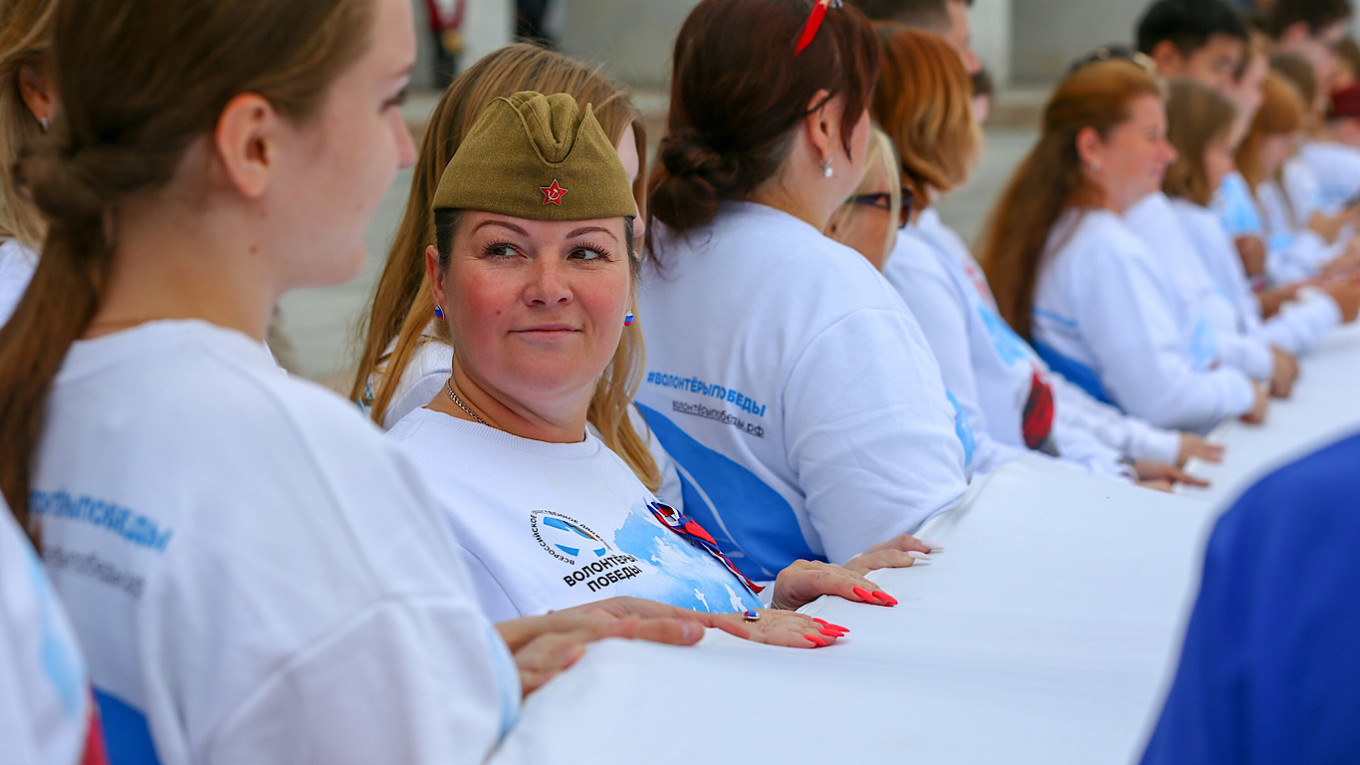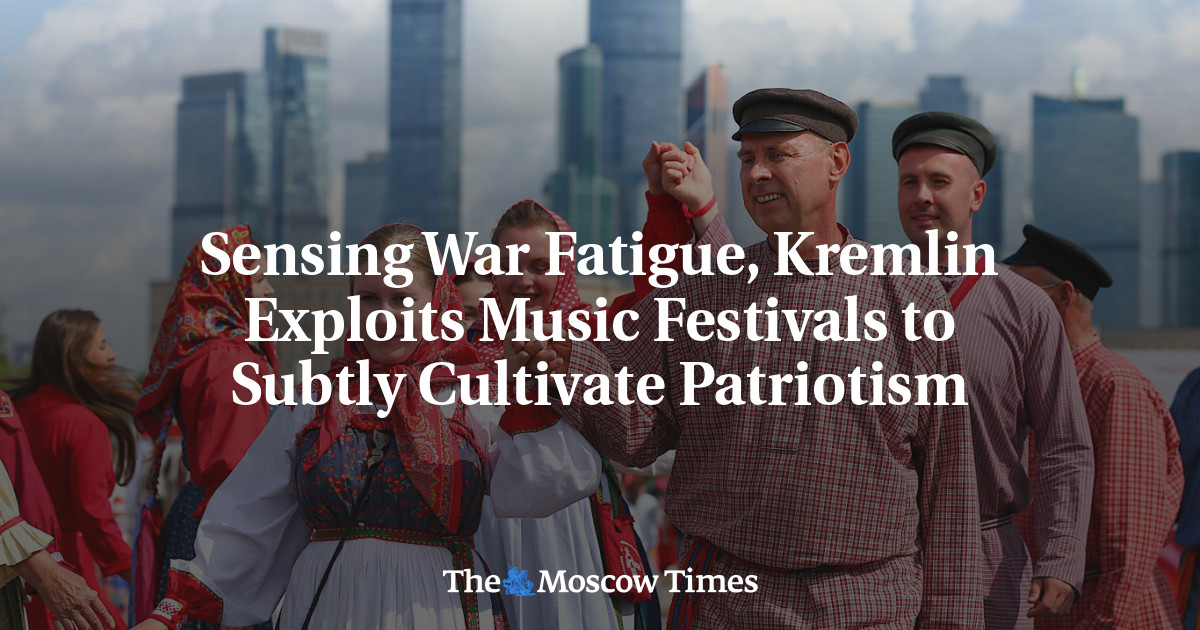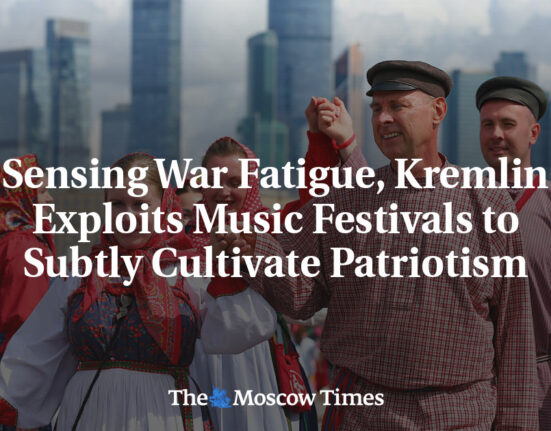“Mother Land, white birch-tree / For me, it’s Holy Rus, for others a splinter,” Tatyana Kurtukova sang from the stage at Moscow’s Poklonnaya Gora, the site of a museum dedicated to the Soviet victory in World War II.
Thousands of voices from the crowd chimed in as she sang the folk-inspired hit “Matushka” a capella.
Kurtukova was performing at a festival marking Moscow’s birthday, where one of the co-headliners was Lyube, the rock band widely believed to be President Vladimir Putin’s favorite.
“People don’t listen to this ironically anymore — they genuinely enjoy it. Everyone is starting to look back at our roots, at Russia’s cultural values,” one woman who attended the concert told The Moscow Times.
“Mostly the younger generation — they’ve begun to identify themselves with Russia and its culture. They’re paying more attention to traditional Russian songs,” she added, speaking on condition of anonymity.
Now in the fourth year of the full-scale war in Ukraine, Russian authorities appear to be fostering loyalty in more subtle ways — seeking to entertain and appeal to Russians’ cultural roots rather than relying on the overtly militaristic propaganda that dominated the war’s early months.
Experts note that cultural content celebrating collective identity often gains traction during periods of social upheaval and crisis.
“People are tired of this endless, dead-end war and militaristic patriotism has given way to escapism,” music critic Artemy Troitsky told The Moscow Times. “Most people, especially the young, are fed up with war propaganda. Instead, entertainment and nostalgic themes are taking center stage.”

This year, authorities have put on a slew of cultural events across the country. The number of summer festivals alone rose by more than a third nationwide compared to last year.
In Moscow, the city government launched Summer in Moscow which was billed as “the largest urban program” and featured cultural, charitable and sporting events, most of them free of charge.
Muscovites who spoke to The Moscow Times said these events were designed to make people feel like “it is the best city on earth — and that’s pretty much how it looked.”
“There were DJs, activity zones, plenty of entertainment and trendy cafés…basketball hoops set up, animators, beanbags scattered on the lawns to relax and painting workshops with easels. Everything was free, the crowd was a decent size, but not too packed,” one Muscovite said, describing the summer events.
She agreed that the authorities make extensive use of musical events, with the current “musical wave leaning toward folk-inspired tunes,” while overtly pro-war songs were generally avoided at large public gatherings.
Still, many festivals across Russia have subtle political undertones, if only because anti-war artists remain banned from performing.
In addition to the more apolitical events, numerous military-patriotic festivals were held this summer in both Moscow and the regions.
Examples include the Avtomat i Gitara (Rifle and Guitar) festival in the Omsk region; grenade throwing in St. Petersburg; patriotic song festival “Our Land — My Russia” in Tyumen; and a patriotic song contest organized by the United Russia party in Udmurtia.
Yet the state’s presence is still felt even at festivals not directly organized by the authorities.
At the VK Festival organized by Russian tech giant VK in Moscow, St. Petersburg and other major cities, banners at the entrance promoted fast-track entry for visitors who had downloaded the state-backed MAX messenger — a domestic alternative to WhatsApp and Telegram that has been criticized for sharing user data with authorities.
“The festival is on a grand scale, the size alone is impressive,” one person who went to the VK Festival told The Moscow Times. “In addition to several stages with nonstop performances, there are plenty of free attractions, from astrologers to hair-braiding. It seems like most of the visitors came from the regions, with a lot of families and children.”
“Before the final performance, everyone sang the Russian national anthem,” she added.
The Kremlin appears to be collaborating with cultural figures to tap into the collective emotions generated by the war, said Oshank Hashemi, a researcher on Russian culture.
In times of war, said Hashemi, “people often express support for the state and display identity markers more prominently — for instance, they might wear or paint the Russian tricolor on their faces.”
“These are also moments when people cling more strongly to what makes them proud and unites. The Kremlin clearly invests in and supports artists who express these feelings,” he said.
While the total amount spent on cultural propaganda since the start of the war remains unclear, the Kremlin has reportedly allocated around 161 billion rubles ($1.7 billion) to patriotic and pro-war projects since 2022.
Official data show that the number of patriotic events, contests and festivals rose from 514 in 2023 to 905 in 2024.
Troitsky said the state’s efforts to promote political ideas can only succeed when they resonate with public sentiment.
One striking example is Intervision, the Cold War-era song contest that Russia revived this year as a counterweight to Eurovision.
While Putin said the event’s aim was to “promote cultural dialogue and strengthen friendship between peoples,” critics saw it as an event deliberately organized for political purposes, with paid extras brought in to fill the audience.
The contest appeared to be tightly managed by the Kremlin. Putin’s domestic policy chief Sergei Kiriyenko chaired Intervision’s supervisory board and held a press conference about it alongside Foreign Minister Sergei Lavrov and Deputy Prime Minister Dmitry Chernyshenko.
Representing Russia was the country’s most prominent patriotic singer, Shaman, who asked judges from 23 countries — including China, Kazakhstan and Brazil — not to score his performance.
Some saw this as a sign that he could not be seen losing as Russia’s representative, while a victory would have spoiled the intrigue of the contest.
According to Troitsky, Shaman is “the only relatively successful” project in terms of pro-war musical propaganda.
“This is a modest achievement at best, especially given the vast amounts of state funding poured into pop propaganda,” he said.
Yet while listeners debated Shaman’s talent and performance, the themes of patriotism and national pride appeared to strike a chord with some.
“I didn’t use to like [patriotic songs], but this time I was moved,” said a woman who attended Kurtukova’s concert.
“I like this trend of loving your country — not the state or the authorities, but the country itself: its nature, culture, education and people. That’s really great,” she said. “Let the people love what they have — without getting involved in politics, but by paying attention to the good and positive aspects.”
A Message from The Moscow Times:
Dear readers,
We are facing unprecedented challenges. Russia’s Prosecutor General’s Office has designated The Moscow Times as an “undesirable” organization, criminalizing our work and putting our staff at risk of prosecution. This follows our earlier unjust labeling as a “foreign agent.”
These actions are direct attempts to silence independent journalism in Russia. The authorities claim our work “discredits the decisions of the Russian leadership.” We see things differently: we strive to provide accurate, unbiased reporting on Russia.
We, the journalists of The Moscow Times, refuse to be silenced. But to continue our work, we need your help.
Your support, no matter how small, makes a world of difference. If you can, please support us monthly starting from just $2. It’s quick to set up, and every contribution makes a significant impact.
By supporting The Moscow Times, you’re defending open, independent journalism in the face of repression. Thank you for standing with us.
Continue
Not ready to support today?
Remind me later.
×
Remind me next month
Thank you! Your reminder is set.


